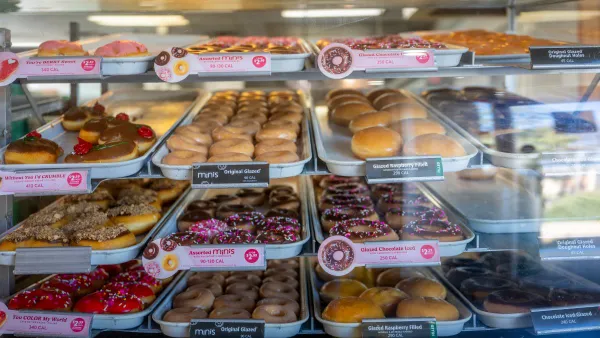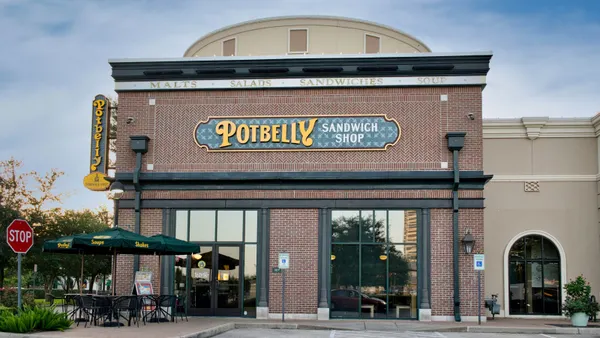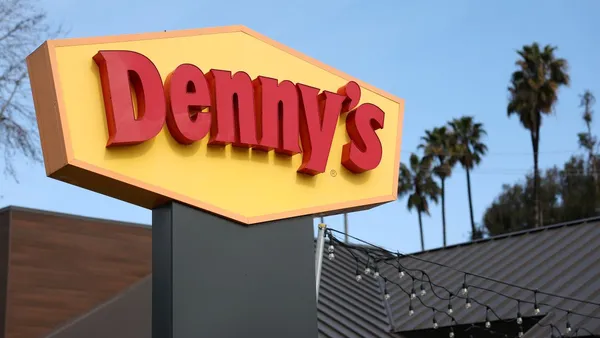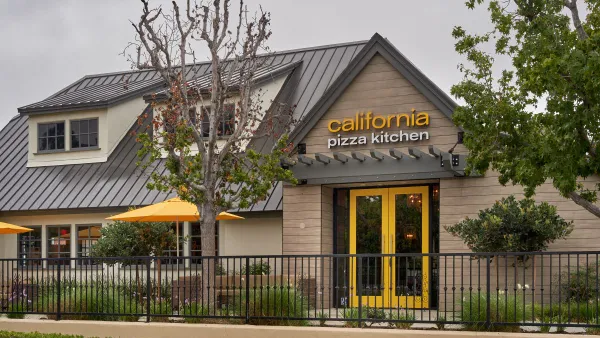UPDATE: Dec. 17, 2018: Jack in the Box announced Monday that the company is exploring strategic and financial alternatives to maximize shareholder value, including a potential sale. The chain has been in talks with potential buyers, but hasn't set a timetable for completing its review.
Dive Brief:
- Reuters reported Thursday that Jack in the Box is exploring a potential sale. This rumor comes nine months after the chain fully divested Qdoba to Apollo Global Management for $305 million. The report drove the chain's stock up 6%.
- Jack in the Box's fourth quarter same-store sales were up just 0.8% from the prior year, when they were down 2%. Total revenue — of $177.5 million — was down 23.5% year over year, according to an earnings release. The company's stock is down nearly 18% from the past year
- The news also comes as tensions continue between corporate and a major franchise base. In October, the National Jack in the Box Franchise Association asked CEO Lenny Comma to step down, while just last week, that same organization filed another complaint due to lease restructuring.
Dive Insight:
It has been a busy year in the restaurant M&A space — including Sonic's sale to Inspire Brands, Bojangles' recent agreement to be acquired and Papa Murphy's exploration of a sale — so this Jack in the Box news is perhaps no surprise. It's tough to be a public restaurant company right now in the midst of industrywide sales and traffic stagnation.
Jack in the Box, in particular, has failed to correct itself following its sale of Qdoba. Comma has blamed the franchisees' unrest on a challenging operating environment, including rising labor costs and weak sales. Conversely, franchisees have blamed their lingering frustrations on dwindling resources and the lack of a chief marketer. Whatever the cause, the company faces a continued grim outlook in the coming months, as the fiscal year 2019 projects only flat to 2% growth.
The disconnect between corporate and franchisees has been months in the making, starting with a no-confidence vote in leadership at the annual franchisee convention in July. Franchisees' frustration has accelerated with the latest dispute over lease restructuring coming to a head just last week.
At this point, a sale may be the only remedy to fix Jack in the Box's issues. Going private can allow the company to be more nimble without more cutting to meet investor expectations. But that may not come easy. As Papa John's is learning, investors tend to be reluctant to go after companies that come with a lot of drama. Analyst Chris O'Cull said that Papa John’s "obstinate" founder, John Schnatter, has been a drag on the company.
Additionally, it may be a bit of a turnoff for investors to acquire a company that has trimmed its corporate resources significantly. Michael Norwich, NFA board chairman, said G&A expenses were 3.9% relative to top-line revenue in 2015. This year, they have shrunk to 1.8%. A nearly-95%-franchised system also adds complexities to a potential deal, especially with the current tension over landlord relationships.
If Jack in the Box doesn't secure a buyer, the company will be left to fend for itself to rectify both sales and franchisee relations. Judging by the past few months, that may be a tall order.








